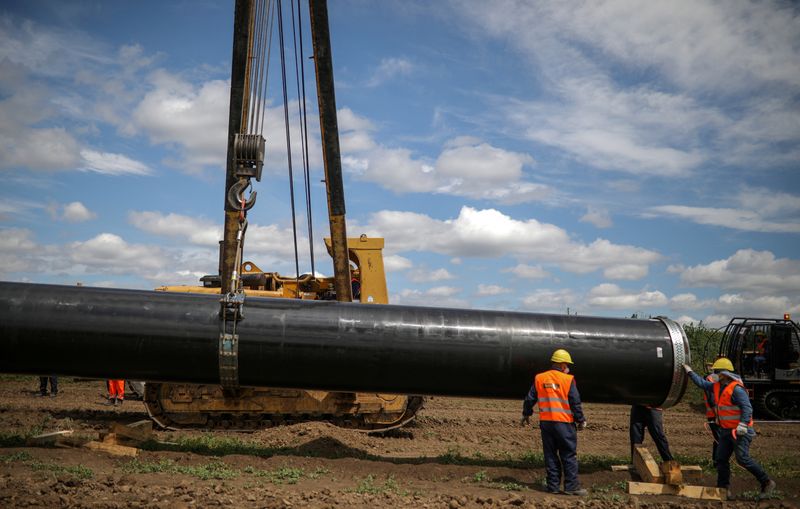Turkey may not supply gas to Europe
2022.12.01 02:34
[ad_1]

Turkey may not supply gas to Europe
Budrigannews.com – According to analysts and sources, President Vladimir Putin’s plan to make Turkey a hub for Russian gas could theoretically allow Moscow to cover up its exports with fuel from other sources, but that might not be enough to convince Europeans to buy.
Until Moscow sent tens of thousands of troops into Ukraine on Feb. 24 in what it called a “special military operation,” Russia supplied 40% of the gas market for the European Union.
The West has since sought alternatives, reduced its purchases of fuels sourced from Russia, and imposed severe sanctions against Russia, including on its oil and gas.
In October, Putin proposed establishing a gas hub in Turkey and expanding on a southern export route after explosions damaged the Russian gas pipeline system Nord Stream under the Baltic Sea. The cause of the explosions is still under investigation.
Putin has predicted that customers in Europe will want to sign contracts and stated that a hub could be established relatively quickly in Turkey without providing any specifics.
Such a long ways there have been no open responsibilities to do as such, and experts express venture as well as time would be required.
Given the EU countries’ determination to avoid Russian gas in the near future, “does Europe need the project?”asked the Institute for Energy and Finance Foundation’s Alexei Gromov.
He also stated that rearranging gas flows within the European Union would be impossible due to the absence of existing connections to the proposed hub from northwestern Europe, which previously received gas via Nord Stream 1.
However, capacity for pipelines and gas is available.
This year, Russia’s exports to Europe decreased by 43.4 percent, and the TurkStream pipeline to Turkey is operating well below its annual capacity of 31.5 billion cubic meters (bcm).
After exports this year of approximately 10.6 billion cubic meters of gas by November 21, senior analyst Zongqiang Luo at Rystad Energy estimated that approximately sixty percent of pipeline capacity was unusable.
Luo of Rystad estimated that it would take at least three to four years to construct the necessary, costly new infrastructure.
“Who will purchase that gas, even if a new pipeline could be constructed?”He pressed.
Others believed that buyers would emerge.
Gazprom, Russia’s monopoly on the export of gas through pipelines (MCX:)it was thought that the hub would make sales easier.
Due to the sensitive nature of the situation, the anonymous source stated, “That will not be Russian gas, but gas from the hub.”
An exchanging source Europe said China, which surpassed Japan to turn into the world’s top merchant of condensed (LNG) in 2021, is as of now exchanging Russian LNG, which has not been named as “made in Moscow”.
He suggested that buyers in eastern and southern Europe might not care where the LNG came from.
Alexander Gryaznov, director at S&P Global (NYSE:), noted that, in contrast to oil, Europe has not imposed an embargo on Russian gas.According to ratings, Europe might be willing to buy from Moscow through intermediaries.
He stated that “Europe is unlikely to want to enter into direct contracts with the Russian Federation,” and that “buying free volumes on the spot market in Turkey will be politically acceptable.” However, he also stated that the establishment of the hub would require both time and resources.
According to Alexei Grivach of the National Energy Security Fund, based in Moscow, the hub offered trading opportunities.
He stated, “Rapid possibilities would open up for all sorts of swap operations if the hub started to work.”
Despite a turbulent past marred by the murder of Russian ambassador Andrei Karlov in Ankara in 2016 and Turkey’s downing of a Russian jet on a mission to Syria a year earlier, Putin and Turkish President Tayyip Erdogan have developed close ties in recent years.
Turkey has stated that the proposed hub could also incorporate the Trans Anatolian Natural Gas Pipeline (TANAP), which transports natural gas from Azerbaijan to the Turkish border.
The heads of Russia’s Gazprom and Azerbaijan’s state energy company Socar, Alexei Miller and Rovshan Najaf, met in Moscow on November 23 to agree to double the pipeline’s capacity from the current 16 bcm “in the short term.”
Gazprom and Socar didn’t say much about the meeting, but Russia agreed to give Azerbaijan 1 billion cubic meters of gas under a new short-term contract this month.
Luo stated that the deal “raised some concerns from the market” regarding a potential gas swap agreement with Russia to export additional gas to Europe.
Russia has returned to a long-standing plan to add two lines to the TurkStream pipeline to double its annual capacity to 63 billion cubic meters with the Turkish gas hub proposal.
According to Gazprom data, that precisely reflects the combined volumes that Russia sold via various routes to Austria, Bulgaria, Hungary, Italy, Serbia, Slovenia, and Turkey in 2020.
At a rate of over 40 million cubic meters per day, Russia supplies pipeline gas to Europe primarily through Ukraine, which is less than half of what it used to sell to the European Union.
Through the TurkStream, it also delivers gas to eastern Europe’s southernmost regions, including Hungary.
The existing TurkStream cost $3.2 billion, and Gazprom and its western partners shared an additional $11 billion for the never-launched Nord Stream 2 gas pipeline through the Baltic Sea.
The Turkish hub concept’s cost was not estimated by Gazprom or the Kremlin. When Reuters asked Dmitry Peskov, the Kremlin’s spokesman, on a daily conference call how Azeri gas could be used in the hub, he declined to provide any additional information.
[ad_2]








